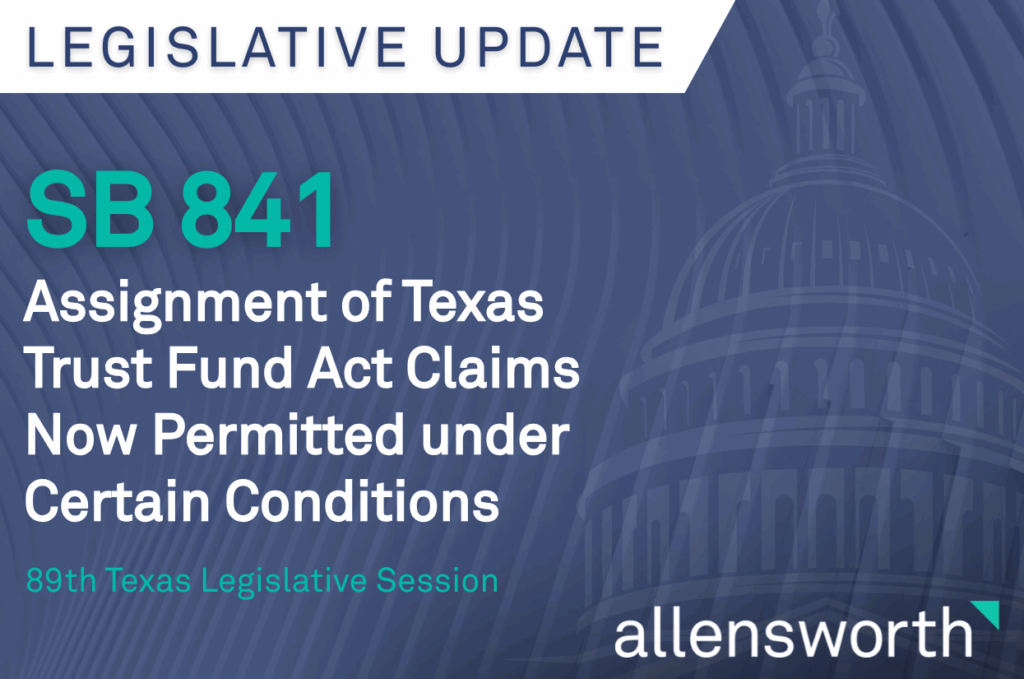
SB 841 amended the Texas Trust Fund Act by prohibiting the assignment of a trust-fund beneficiary’s interest in unpaid trust funds unless certain conditions are met. These amendments are reflected in Section 162.003(a) and the newly added Section 162.0031 of the Texas Property Code.
The Texas Trust Fund Act, set forth in Chapter 162 of the Texas Property Code (Act), designates construction payments as “trust funds” if the payments are made to a contractor or subcontractor (or to their officer, director, or agent) under a construction contract for the improvement of public or private real property in Texas (with some exceptions). The Act also designates “loan receipts” as trust funds if they are borrowed by a contractor, subcontractor, or owner (or by their officer, director, or agent) to improve real property in Texas, and the loan is secured in whole or in part by a lien on the property.
A person/entity who furnishes labor or material for the construction or repair of an improvement on such above-referenced real property (and now, that person’s qualified assignee) is a “beneficiary” of trust funds paid or received in connection with the improvement. A property owner can also be a beneficiary in connection with residential construction.
A party who receives or has control or direction of trust funds is a “trustee” of those funds under the Act. “A trustee who, intentionally or knowingly or with intent to defraud, directly or indirectly retains, uses, disburses, or otherwise diverts trust funds without first fully paying all current or past due obligations incurred by the trustee to the beneficiaries of the trust funds, has misapplied the trust funds.” Beneficiaries therefore have a civil cause of action against trustees who misapply trust funds under the Act.
Previously, the Act contained no language directly addressing the assignment of claims arising from a beneficiary’s interest in trust funds, and Texas courts had not definitively decided whether such claims are assignable. With these amendments, the Texas Legislature has clarified that a trust-fund beneficiary’s assignment of its interest in unpaid trust funds will not be enforceable unless the specific conditions outlined below are met.
First, the assignment must be made in writing and no earlier than the date the assignee has paid the beneficiary for the assignment. Second, the assignment cannot be contained in or made as a part of the beneficiary’s construction contract—it must be contained in a separate agreement. These first two conditions will prevent such assignments from being included in form construction contracts as a matter of course and before the assignment actually arises. Third, the assignee must also be a “beneficiary, trustee, or property owner” under the construction contract under which the payment of trust funds is made. This third condition would limit potential assignees to those parties already contracted on the project—e.g., owners, contractors, subcontractors—and exclude unrelated parties from taking enforceable assignment of these claims, which may be interpreted to include factoring companies, etc. Finally, written notice of the assignment must be provided to the property owner and the contractor on the project within 7 days after the assignment is made.
This bill provided needed clarity in the construction industry on the permissibility of assigning claims under the Act. According to the bill’s author, these amendments were specifically intended to provide recourse to general contractors that properly pay their subcontractors and suppliers, but where those subcontractors and suppliers in turn do not pay their subcontractors and suppliers. Prior to SB 841, only the unpaid party had upstream recourse against the bad actor. Now, the party that paid the bad actor would also have downstream recourse under the Act.
This bill took effect on September 1, 2025, meaning that all qualifying assignments made on or after this date will be enforceable under the Act. To the extent attempted assignments of claims under the Act were executed prior to September 1, 2025, parties should consider re-executing such assignments in accordance with SB 841, with an effective date on or after September 1, 2025.